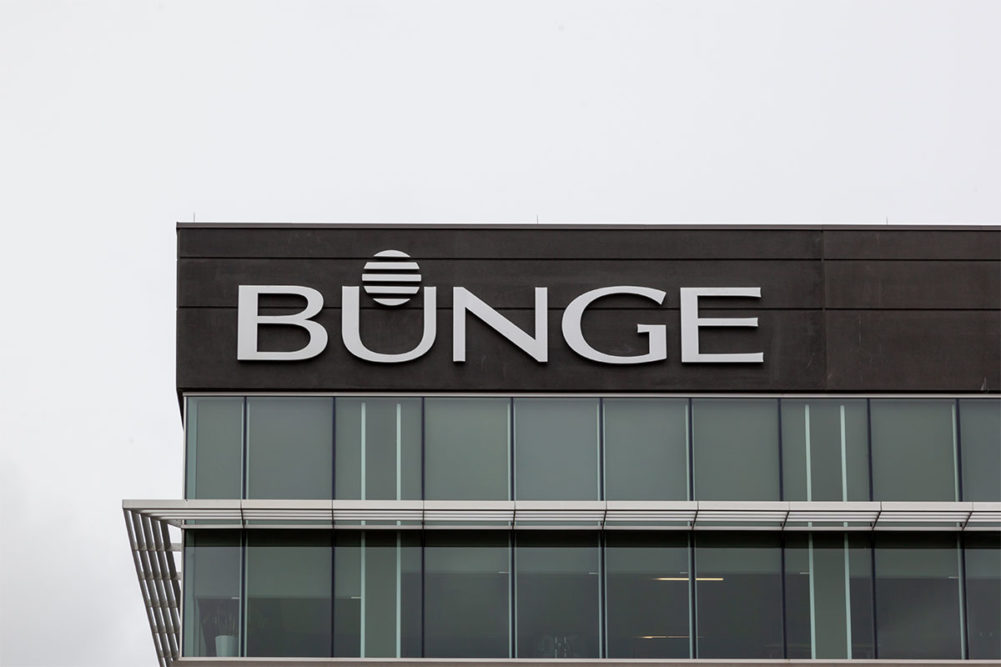ST. LOUIS — Limited visibility into the back half of fiscal 2024 has Bunge Ltd.’s top executive guarded about the company’s short-term prospects following a first quarter in which both income and sales were down sharply from a year ago. While saying the company was “off to a good start amid a more balanced market environment than we’ve experienced over the past few years,” Gregory A. Heckman, chief executive officer, also acknowledged many of the dynamics in place last quarter remained in play to start fiscal 2024.
Bunge net income in the first quarter ended March 31 was $244 million, equal to $1.68 per share on the common stock, down 61% from $632 million, or $4.15 per share, in the first quarter of fiscal 2023. The most recent quarter included $61 million of acquisition and integration costs related to the pending merger with Viterra.
Sales totaled $13.42 billion, down 12.5% from $15.33 billion a year ago.
On an adjusted basis, earnings per share were $3.04 in the first quarter of fiscal 2024, down from $3.26 in the same period a year ago. Bunge reaffirmed its full-year adjusted EPS of approximately $9, reflecting “first-quarter results and the current margin environment and forward curves.”
Following the release of the financials on April 24, shares of Bunge dipped as low as $102.42 before closing at $105.79, down 3.5% from the previous day’s close of $109.62.
“Our team’s capabilities and our global platform again demonstrated we can navigate shifts in supply and demand with agility and speed,” Heckman said during an April 24 conference call with analysts. “Our focus remains on delivering great value to all stakeholders while investing to strengthen our business so that we can provide customers with solutions not only today but over the longer term.”
During the first quarter of fiscal 2024, segment EBIT within Agribusiness totaled $278 million, down sharply from $705 million in the same period a year ago. Adjusted segment EBIT, though, was $487 million in the first quarter of fiscal 2024, down 5% from $512 million in the first quarter of fiscal 2023. Sales decreased 10% to $9.74 billion from $10.85 billion, while volumes increased to 20.19 million tonnes from 18.39 million tonnes a year ago.
“In Agribusiness, processing results of $411 million in the quarter were up slightly from last year, as higher results in Europe and Asia crush value chains were partially offset by lower results in North and South America,” said John W. Neppl, executive vice president and chief financial officer. “In merchandising, lower results were primarily driven by our global grains and oils value chains where higher volumes were more than offset by lower margins.”
In the Refined and Specialty Oils segment, EBIT was $226 million, down 3% from $233 million a year ago. Adjusted segment EBIT, meanwhile, was $204 million, down from $234 million a year ago. Sales were $3.24 billion, down 17% from $3.89 billion, while volumes were 2.2 million, up from 2.15 million tonnes.
Neppl said it was a solid quarter for Refined and Specialty Oils, led by stronger results in Europe. Offsetting the results in Europe were softer results in North America and Asia, he said. South America was flat compared with last year, he added.
Milling segment EBIT totaled $33 million, up sharply from $9 million a year ago. Adjusted segment EBIT was $28 million, up from $10 million. Sales fell 26% to $381 million from $515 million. Volume increased to 874,000 tonnes from 821,000 tonnes.
“In Milling, higher results were driven by South America, reflecting improved margins in milling operations and a more favorable origination market environment,” Neppl said.
Looking ahead to the rest of fiscal 2024, Neppl said full-year results in Agribusiness are forecast to be down from last year with slightly lower results in processing where margins remained compressed in most regions. Full-year results in Refined and Specialty Oils are expected to be down from the record prior year, reflecting a shift in supply environment, particularly in the United States. Milling, meanwhile, is forecast to be up in the full year, he said.
Earlier on April 24, the Competition Bureau of Canada issued a report saying Bunge’s proposed acquisition of Viterra Ltd. is likely to result in substantial anti-competitive effects and a significant loss of rivalry between the two companies in agricultural markets in Canada. The Bureau determined the transaction is likely to harm competition in markets for grain purchasing in Western Canada, as well as for the sale of canola oil in Eastern Canada. It also found that Bunge could materially influence the economic behavior of G3 Global Holdings, a major competitor to Viterra. As a minority shareholder of G3, Bunge has access to G3’s confidential competitively sensitive information, the Bureau noted.
Commenting on the announcement during the conference call, Heckman said overall Bunge is pleased with the progress it is making toward the transaction.
“I mean if you look, we got to file in … 40 jurisdictions and 28 of those have issued unconditional clearances at this point,” he said. “Of the remaining 13, of course, we’ve got some of the big ones — US, Canada, Brazil, China and the EU. If you remember, Argentina is post-closing review. So, while overall, we don’t know exactly when we’ll get the green light, but we sure haven’t seen anything that indicates any material risk to the economics of the deal.
“From a Canada specific, look, it’s good that, that step of the regulatory process is completed and that the Competition Bureau report as you look through it, the good news in there is they had no concerns with much of what we’re doing on the grain purchasing side, the meal sales at ports, the majority of our refined and special oil product sales. So, on where there were concerns and topics raised, we look forward to discussing those in greater detail, and we’ll be happy to engage as we have been with all the regulators as they raise concerns.”




